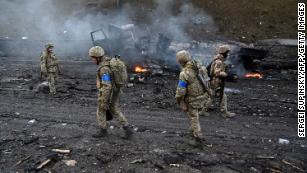The report also notes that the circulation of accurate information about the war has been extremely limited within Russia, even at the highest levels of society.
For example, many people and well-connected individuals with the means to leave Russia before airports and borders were closed have remained in the country, according to the report — suggesting that they had not known about the closures in advance.
The report, which originated from the FBI, comes with some caveats: It acknowledges that the source who provided the information to the FBI “may have provided the information to influence and inform” US decision-making — in other words, that it might be an information operation designed to manipulate the United States.
And officials caution that raw intelligence should not be taken as fact. It has not been evaluated for reliability or analyzed for its implications.
But the report has nevertheless caused other agencies inside the Biden administration to ask the FBI to follow up with its source for additional information.
The Office of the Director of National Intelligence, the CIA and the FBI declined to comment.
A long history
Speculation about Putin’s mental health began after he gave a speech on Thursday laying out a warped, revisionist history that purported to justify his intervention in Ukraine. Sen. Marco Rubio, a Florida Republican, tweeted on Friday that Putin “has always been a killer, but his problem now is different & significant” — and suggested he was basing his assessment on intelligence briefings given to him as the vice chair of the Senate Intelligence Committee.
“I wish I could share more,but for now I can say it’s pretty obvious to many that something is off with #Putin,” Rubio wrote. “It would be a mistake to assume this Putin would react the same way he would have 5 years ago.”
For some, the boldness of Putin’s decision to invade — as well as his implied threat to use nuclear weapons — is a break with the carefully calculated and far more limited military campaigns he has launched in the past. Video footage of the Russian President seated dozens of feet away from his senior military advisers during meetings and gleefully dressing down one of his spy chiefs on television have only underscored the image of an isolated leader, acting on his own counsel alone.

By Sunday, the floodgates had opened. Former Ambassador to Russia Michael McFaul tweeted that Putin had “changed,” and sounded “completely disconnected from reality” and “unhinged.” Former Director of National Intelligence Jim Clapper, who is a national security analyst at CNN, also called Putin “unhinged” and warned, “I worry about his acuity and balance.”
Other longtime Putin watchers argue that the Russian President’s recent actions are relatively consistent with the man US intelligence has fixated on for decades, noting that he has long demonstrated a willingness to risk military
oofos shoes defeat in operations that the United States thought offered no chance of success — including ordering a second invasion of Chechnya in 1999, just three years after the Russian military had already been defeated there once.
“This is not different than anything he’s said before, he’s just saying it all at once in a very stark way. And he’s willing to do unspeakable things — but he’s always been willing to do unspeakable things,” said Beth Sanner, a former briefer to then-President Donald Trump and a CNN national security analyst.
Putin isn’t “insane or unhinged,” Sanner said. Rather, she said, he is “highly emotional right now because of what he was about to embark upon … and he has been very, very isolated, which adds to that emotional sense. But I don’t think he’s crazy.”
One US official echoed that assessment to CNN, arguing that Putin is acting in a way that he has long signaled he was capable of. Rather than a change in his mental acuity, this person said, officials believe he’s simply become enraged — making it impossible for his senior advisers to give him frank assessments.

Even his command to put Russia’s nuclear deterrent forces on high alert Sunday isn’t unprecedented. In 2014, when Putin annexed Crimea, he also raised the possibility he might put his nuclear forces on high alert, which then as now raised the specter of nuclear weapons being introduced into the conflict.
Russia’s nuclear doctrine, published in 2020, also includes a first-use nuclear policy. The Kremlin “reserves the right to use nuclear weapons,” including “for the prevention of an escalation of military actions and their termination on conditions that are acceptable for the Russian Federation and/or its allies.”
Still, a source familiar with recent intelligence reporting on the topic said, it is “difficult to achieve conclusion of any confidence regarding Putin’s state of mind. Would need SIGINT of phone call/video of leader losing it on his cabinet or something like that.”
SIGINT, or “signals intelligence,” is an intelligence community term that refers to intercepted communications.
“Real-time communication between Russian cabinet leaders,” this person said, is a “very hard target.”
Ultimately, this official and others say, understanding Putin’s recent behavior is a matter of analysis — not intelligence. It’s possible, officials say, that they may never have an answer.


















+ There are no comments
Add yours